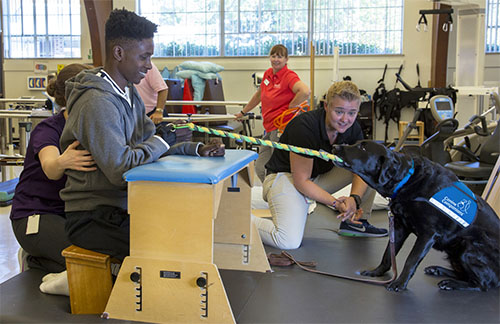Home » Service Dogs » Our Dogs » Facility Dogs
Facility Dogs

Facility dogs are expertly trained dogs who partner with a facilitator and work in a health care, visitation or education setting.
A Canine Companions facility dog is trained to perform service dog commands including picking up items, opening doors and providing calming pressure across the client’s lap or body. Their trained skills can be utilized to enhance therapies, promote participation and reduce anxiety for clients in professional environments. A Canine Companions facility dog is bred to be calm, reliable and affectionate in order to assist in the development of independent living skills. Additionally, the handler can integrate a facility dog into a variety of structured therapies and utilize it to facilitate social interactions.
Examples of settings in which facility dogs can assist include:
Occupation, speech and physical therapy
Special Education settings
Child Life Specialists
Criminal justice placements such as child advocacy, forensic interviewers
Eligibility requirements to receive a facility dog :
- Work directly with vulnerable clientele for a minimum of 20 hours a week
- Have the support and approval from their employer for the use of a facility dog
- Demonstrate the ability to safely and effectively control, manage and care for a dog
- Have adequate vision to observe, intervene, and manage a dog’s behavior (generally equivalent to DMV license requirements)
- Able to attend a two-week Team Training class at a Canine Companions training center
- Able to participate in on-going Canine Companions training and graduate support program
- Able to utilize the tasks the facility dog is trained to do to encourage and support clients
Canine Companions facility dogs and follow-up services are free of charge.
The process to receive a Canine Companions facility dog includes multiple steps. Click the button below to find out if a facility dog is right for you and your clients and start the process to receive more information.
Please note: Canine Companions does not train or place dogs for the following: to do guide work for the blind, to do seizure or diabetic alert/response, to anticipate or detect medical symptoms, for the primary benefit of emotional comfort, to recognize and/or manage undesirable human behavior, to provide supervision, navigation, or safety from environmental hazards, to respond aggressively, to provide personal protection, to assist with the management of mental illness as a primary condition.
